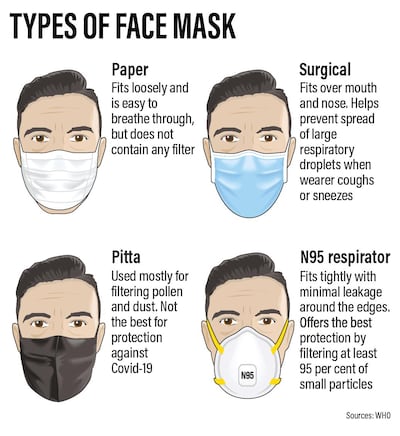Related: Covid-19: are two masks better than one?
Record low numbers of seasonal influenza have been recorded across the UAE, in a medical phenomenon noted by doctors around the world.
A perfect storm of mandatory face masks, improved hygiene and distance learning in schools have contributed to clinics seeing a fraction of the usual respiratory infections this winter.
Typically, doctors would expect to treat up to 40 cases of flu each at this time of year.
Dr Fadi Baladi, medical director at hospital group Burjeel, said he did not record a single case throughout January at his Reem Island surgery.
“We were all noticing a significant drop off in flu cases across our clinics this winter and that is down to two factors,” he said.
“More people took the flu shot because of the pandemic scare and face masks have been doing magical things.
“I have not seen a single case of flu this year in my practice – usually it is flooding our centres.”
Clinics across the country reported a significant spike in demand for the flu shot at the onset of influenza season in October.
That was attributed, in part, to wrong assumptions that it could offer protection against Covid-19.
While both viruses offer similar symptoms of fever and fatigue, each has its own distinct tell-tale signs, making it relatively straightforward for doctors to make an on-the-spot diagnosis.
When there is doubt, a nasal swab is taken for analysis to determine the presence of either Influenza A or B, or other viral infections.
Yet the number of swabs required this winter were also considerably down on previous years.
“We can make 80 to 90 per cent of diagnoses in the clinic for flu, so it is very easy to spot the difference,” said Dr Baladi.
“I can tell by the flu swabs, similar to the Covid-19 tests, that give instant results in the office.
“We usually order every week but we have not had to order any replacement stocks yet this winter.”
The low numbers of flu this year were forecast by medics as early as August.
In early 2020, fewer flu cases recorded in the southern hemisphere signalled this year’s season may not be as severe as some feared.
Australia recorded just 36 flu-related deaths from January to June, down from 430 the previous year, while Chile recorded almost 19,000 fewer seasonal respiratory infections.
Plunging cases of influenza brought relief to stretched health authorities across the world, as the pandemic continues to drain resources.
Data from the UK’s Royal College of General Practitioners research and surveillance centre said flu cases had dropped 95 per cent this year, when compared with the five-year average.
It is a similar pattern globally, with only Cambodia, Bangladesh and the Ivory Coast reporting any significant spread of influenza. Each country also recorded relatively low numbers of coronavirus.
While there have been no Covid-19 deaths from Cambodia’s 466 cases, the virus has claimed 154 lives in the Ivory Coast from 28,399 infections, out of its population of 25.7 million.
Although flu has also taken hold in Bangladesh, the country has reported just 8,127 Covid-19 deaths from its population of 163 million.
Dr Fatemeh Aghanasiri, a GP at the Aster Clinic in Arabian Ranches, was staggered by the "face mask effect” on combatting seasonal flu in the UAE.
“It is incredible, I have never seen this in Dubai before,” she said.
“From September onwards once the schools reopen we begin to see a lot of cases of flu, usually up to 40 cases every day.
“This year that has not happened. The numbers are extremely low for both upper and lower respiratory infections.”
Rates of bronchitis also appear to be in decline. Dr Aghanasiri would commonly expect to treat between 10 to 15 patients each winter in her clinic, but so far has come across a just a handful of cases.
“The flu virus is still there, but it is not being passed around like before and that is largely down to face masks,” said Dr Aghanasiri.
“People are learning how effective they are and now understand how they can protect against catching any viral infection.”











